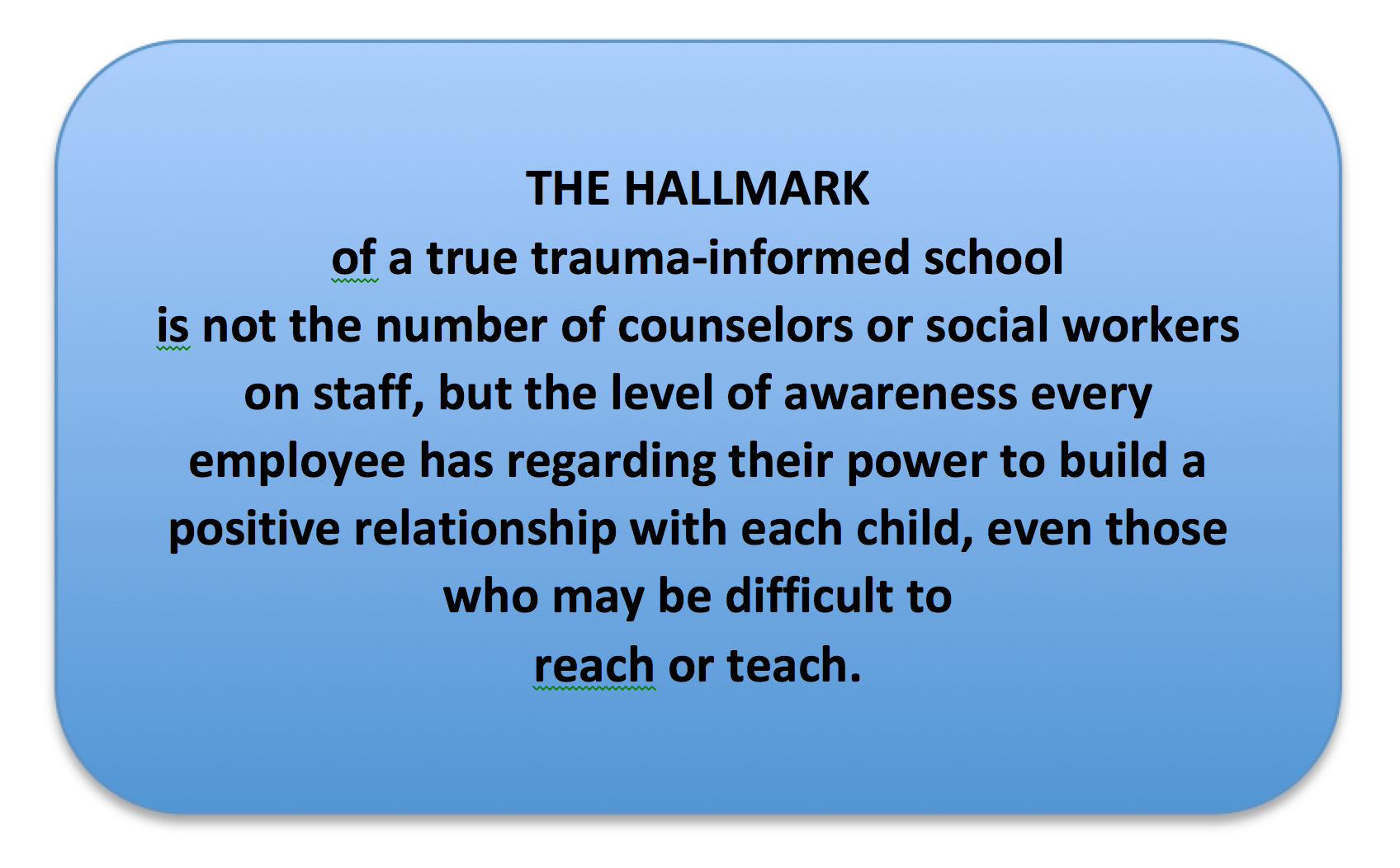In Part I of my blog article on the Nine Facets of a Comprehensive Trauma-Informed School Organization, I focused on the importance of a Task Group to oversee the process and planning for trauma-informed training.
Facet Number Two– A Universal Precaution Approach
Trauma is endemic across all age groups, not just teens. Trauma-informed practices are most efficacious when these are taught to all staff and applied at all levels – pre-school, elementary, middle school and high school. Understanding trauma must become common knowledge for every employee, not just teachers. From school board members, to incoming new hires, to bus drivers and cafeteria staff, no employee is exempt from learning about trauma and Adverse Childhood Experiences and the subsequent science we know about trauma’s life-long effects and how what we do can either mitigate or re-traumatize someone.

Where there is a caring heart, there is hope for tomorrow.
A universal precaution approach is not just about the number of children and adults who may have ACES. It is about permanently changing our own responses and interactions with others. We cannot afford to assume we know which children may have trauma and which do not. In a school setting, whether it is in a classroom, the lunchroom, playground, or the bus, how the supervising adult responds to one student is observed by and affects all the other students present. A universal precaution approach is a prescribed, consistent method of responding. A universal precaution approach is exactly how “Blood-born pathogens” training was designed. Everyone must know what to do when confronting a situation that poses a risk of possible exposure to infectious diseases. One does not assume there is no risk, but respond every time by putting on gloves and following medically sound protocols for any situation involving bleeding or cleaning body fluids. The nurse cannot be the only person who puts gloves on to help a child with a nose-bleed. Without exception, all adults must learn the protocols for their own well-being and to protect others.
Just as we did not expect all employees to become nurses, in trauma-informed practices we do not expect all adults to become therapists. Mental health practitioners are licensed professional, so we are not expecting bus drivers, principals, teachers or any other staff to provide therapy or counseling to our students. What a universal precaution approach to trauma means is that every employee is made aware of trauma and is trained to make informed choices in carrying out their respective roles for working with children.
With this approach, every adult has the potential for a positive impact on each child in his or her care. Historically, schools rely on a deficit model of addressing student needs. This is the opposite of a trauma-informed approach. In a deficit model, those students with lagging skills are referred to a specialist who focuses on helping the child learn or compensate for those
 lagging skills so they can still achieve the academic goals. The intention is to provide extra support in a targeted area and I have seen children make progress academically that otherwise is unlikely to occur without the specialist.
lagging skills so they can still achieve the academic goals. The intention is to provide extra support in a targeted area and I have seen children make progress academically that otherwise is unlikely to occur without the specialist.
With trauma however, the deficit model does more harm than good. It is not good enough to refer a child to a counselor and remain uninformed and unaware of how your own interactions can negatively impact that child. The Nine Facets remind school staff that all children, whether they have experienced trauma or not, need positive relationships with caring, self-regulated adults. These relationships not only help children receive the care they need, they also serve as a model for what it means to be a positive, caring adult. Children learn how to behave from the adults around them. Trauma-informed training helps schools provide the best example of caring, and trustworthy adults to our children.
So the hallmark of a true trauma-informed school is not the number of counselors or social workers on staff, but the level of awareness every employee has regarding their power to build a positive relationship with each child, even those who may be difficult to reach or teach. In fact, these are the very children that most need a caring and trustworthy adult in their lives.
End of Part II – Universal Precaution Approach
Next – The Six Touchstones of Training
